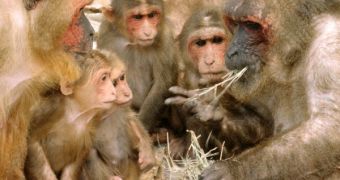In a new set of studies, researchers have demonstrated that the suspicions we show towards distorted faces and unconventional looks may actually be something that is rooted in our DNA. Additionally, the same investigations have also discovered that the trait might have evolved further back in the past than first predicted, creating a new perspective on what could be an evolutionary adaptation. The phenomenon is called “uncanny valley,” and can be easily noticed in people looking at a robot that mimics human expressions, but not in a natural way, the BBC News reports.
While observing this behavior in humans is somewhat to be expected, scientists were completely surprised when they recorded it in macaque monkeys as well. When presented with computer-generated replicas of actual macaques, the primates behaved normally, showing their interest in the “newcomers.” However, when renditions that did not quite match the original were shown, the monkeys were able to recognize the difference, and stared at the models. The differences did not have to be very great in order for this effect to be produced, the researchers say.
“We were not terribly surprised that they show an uncanny valley effect. What I am surprised by is that we can evoke it using such a rudimentary procedure – measuring simply how long they look. The animals were not trained or rewarded yet they were completely consistent in their reactions,” Princeton University neuroscientist Dr. Asif Ghazanfar, the leader of the investigation, adds. More detailed results of the investigation appear in the latest issue of the journal Proceedings of the National Academy of Sciences (PNAS).
“What we wanted to do was make a monkey avatar to interact with real monkeys. That would allow us to have real time social interaction occurring where we monitor brain activity in a real monkey. Having an avatar gives us complete control over one side of the interaction which is unprecedented. I think there's a lot of interest in it because there's an increasing number of folks who are pursuing human interaction with artificial agents. We can demonstrate that evolutionary hypotheses are tenable and that the uncanny valley has something to with social experience and neural processes across many primate species,” he shares.
Experts hypothesize that we may have developed the habit of shunning or noticing individuals who are different than we are because, in the earliest days of our evolution, we were more prone to getting sick when one of us was already ill. Infections spread quickly, and, therefore, any physical symptom of an ailment would have most likely equaled a death sentence, or at least the obligation of the sick person to leave the group.

 14 DAY TRIAL //
14 DAY TRIAL //